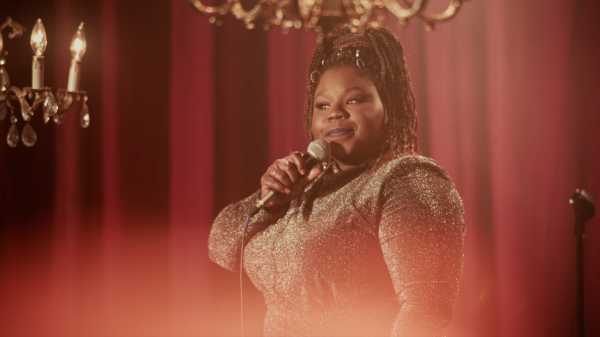
Conceived during COVID, the film is a testament to the space that Black people, and specifically Black women, hold for one another in times of joy and adversity.
“You Go Girl!,” directed by Shariffa Ali, tells a story in two parts. The first scene begins at dusk, on a frosty trail, in the Pacific Northwest. A Black woman who is decked out in hiking gear, named Audrey Jenkins, embarks on a hazardous trek up a steep, wooded mountain. In the other universe of the story, Audrey is onstage at a swanky Brooklyn comedy club, in a silvery dress, with full hair and makeup. She begins her set in front of an apathetic audience. Her gaze keeps drifting just beyond the stage, to an ornate couch marked “Reserved”—but there’s no sign of an occupant. It’s for her mom, who happens to be running late to the show, she reveals to the crowd.
The film toggles back and forth between the two distinct environments: on the mountain, recorded with varying degrees of warm natural lighting; and in the club, which is dim and saturated with a splashy, jewel-toned palette. Audrey journeys up the peak and is interrupted by cutaways to her comedy set. She struggles on the climb and runs into various groups of people. A handsome fellow on a run acknowledges her as he jogs past, followed by two parents with their young children. Later, Audrey stumbles while on a sloping incline and lets out a screech that echoes in the alpine air.
The New Yorker Documentary
View the latest or submit your own film.

Onstage, Audrey is animated, boisterously delivering bit after bit about her mother, specifically riffing on her tardiness (“Black mamas are late to everything”), her fondness for the outdoors (she’s a “Black mountain Barbie”), and her disapproval with Audrey’s life decisions. There’s an edge to the jokes—an implicit hint of disappointment underneath her humor. “The first audience member is the parent,” Ali said. “And so what happens? How do you carry on, how do you persevere when Mom is late again, Mom is not there? Where is she?”
When she eventually nears the summit, with the aid of a makeshift walking stick, Audrey sees a Black couple, and the woman in the pair turns and shouts, “You go, girl!” Conceived during COVID, the short film, which Ali hopes will be “an elixir of healing” for those who view it, is a testament to the space that Black people, and specifically Black women, hold for one another in times of joy and adversity. “ ‘You belong, you are here, I see you, keep going’ . . . We tell ourselves that we O.K., we here,” Ali told me.
The gravity of each scene is anchored by what happens in the other, as the film eventually unveils the close connection between these two critical moments in Audrey’s life. “In both instances, this same person is on a hike. In one, we witness Audrey climbing up a path or a trail that has been set out for her by her mother. And, in another world, we see Audrey climbing up the mountain that she has set for herself,” Ali told me.
The film was created after Ali and her team won the Outdoor Adventure Film Grant competition—a collaboration between Travel Oregon and the Oregon Made Creative Foundation—which aims to challenge historical inequity and the exclusion of people of color in outdoor spaces, and to support BIPOC-created films that feature nature in Oregon. “To be a Black body and to just exist in that space is to put forward an act of resistance,” Ali said. “To be Black, plus-size, and a woman alone in nature—a radical act.”
Sourse: newyorker.com






